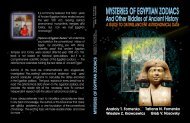possession in the common law - HiddenMysteries Information Central
possession in the common law - HiddenMysteries Information Central
possession in the common law - HiddenMysteries Information Central
Create successful ePaper yourself
Turn your PDF publications into a flip-book with our unique Google optimized e-Paper software.
2<br />
PREFACE.<br />
THE want of any systematic account of Possession <strong>in</strong> English <strong>law</strong>-books has often been remarked upon. A few years<br />
ago, <strong>in</strong> <strong>the</strong> course of my work on <strong>the</strong> <strong>law</strong> of Torts, I had to consider <strong>the</strong> learn<strong>in</strong>g of Trespass, Conversion, and o<strong>the</strong>r<br />
wrongs to property; for which purpose it became necessary to face <strong>the</strong> question whe<strong>the</strong>r a doctr<strong>in</strong>e of Possession did not<br />
exist <strong>in</strong> an implicit form <strong>in</strong> our authorities, and if so, what k<strong>in</strong>d of doctr<strong>in</strong>e it was. I <strong>the</strong>n learnt that, several years earlier,<br />
Mr. R. S. Wright had been confronted with a like problem <strong>in</strong> a survey of our crim<strong>in</strong>al <strong>law</strong>, and had made a full study of<br />
<strong>the</strong> subject <strong>in</strong> that connexion. Upon communication with Mr. Wright it appeared that he had collected his materials <strong>in</strong> a<br />
form nearly ready for publication; and, <strong>in</strong> <strong>the</strong> result, <strong>the</strong> present work was undertaken.<br />
It is a composite, not a jo<strong>in</strong>t work. We should have preferred for many reasons to comb<strong>in</strong>e our researches <strong>in</strong> a s<strong>in</strong>gle<br />
and uniform exposition, but we found that such a plan would require an amount not only of cont<strong>in</strong>uous but of<br />
simultaneous leisure beyond what we could command. Accord<strong>in</strong>gly we have been content to divide <strong>the</strong> work as it now<br />
stands; and, although we have discussed many parts of <strong>the</strong> subject toge<strong>the</strong>r, and seen one ano<strong>the</strong>r’s contributions <strong>in</strong> every<br />
stage, each of us is alone answerable for that which is ascribed to him on <strong>the</strong> title-page. Whatever defects are <strong>the</strong><br />
necessary consequence of this arrangement may be taken as confessed, with <strong>the</strong> excuse that <strong>the</strong> substance, be its value<br />
more or less, could not have been produced on any o<strong>the</strong>r terms. This be<strong>in</strong>g so, we have not thought it needful to reduce<br />
<strong>the</strong> mechanical details of citation, abbreviation, and <strong>the</strong> like, to a complete uniformity throughout <strong>the</strong> book.<br />
Our purpose has been to show that a fairly consistent body of pr<strong>in</strong>ciples is conta<strong>in</strong>ed <strong>in</strong> <strong>the</strong> English authorities, not to<br />
exhibit all <strong>the</strong> applications of those pr<strong>in</strong>ciples, nor to enter on <strong>the</strong> comparison of <strong>the</strong> Common Law with any o<strong>the</strong>r<br />
system. Speak<strong>in</strong>g for myself, I feel that I owe much both to <strong>the</strong> classical Roman texts on Possession and to <strong>the</strong> <strong>in</strong>genuity<br />
of <strong>the</strong>ir modern expounders <strong>in</strong> Germany. But I have also felt that if <strong>the</strong>re is, as I believe <strong>the</strong>re is, a native doctr<strong>in</strong>e of<br />
Possession <strong>in</strong> our <strong>law</strong>, <strong>the</strong> only way to make it manifest is to state it on its own <strong>in</strong>dependent foot<strong>in</strong>g and verify it <strong>in</strong> its<br />
own light. Comparison is profitable after <strong>the</strong> several th<strong>in</strong>gs to be compared have been ascerta<strong>in</strong>ed; if attempted earlier, it<br />
is hazardous at best.<br />
Each of us has been compelled to form and express his own op<strong>in</strong>ions on difficult and unsettled po<strong>in</strong>ts. We cannot<br />
expect those op<strong>in</strong>ions to be always accepted by <strong>the</strong> reader, but <strong>in</strong> any case <strong>the</strong>y are not unconsidered.<br />
LINCOLN’S INN, Michaelmas, 1888.<br />
F. P.



